Remedies Available for Breach of Contract - Desklib
VerifiedAdded on 2023/06/11
|9
|2422
|59
AI Summary
This essay discusses the remedies available to the affected party in case of breach of contract. It explains common law remedies such as compensatory damages, liquidation damages, punitive damages, nominal damages, and restitution. It also covers equitable remedies such as specific performance, injunction, and rescission. The essay cites relevant case laws to support the discussion.
Contribute Materials
Your contribution can guide someone’s learning journey. Share your
documents today.
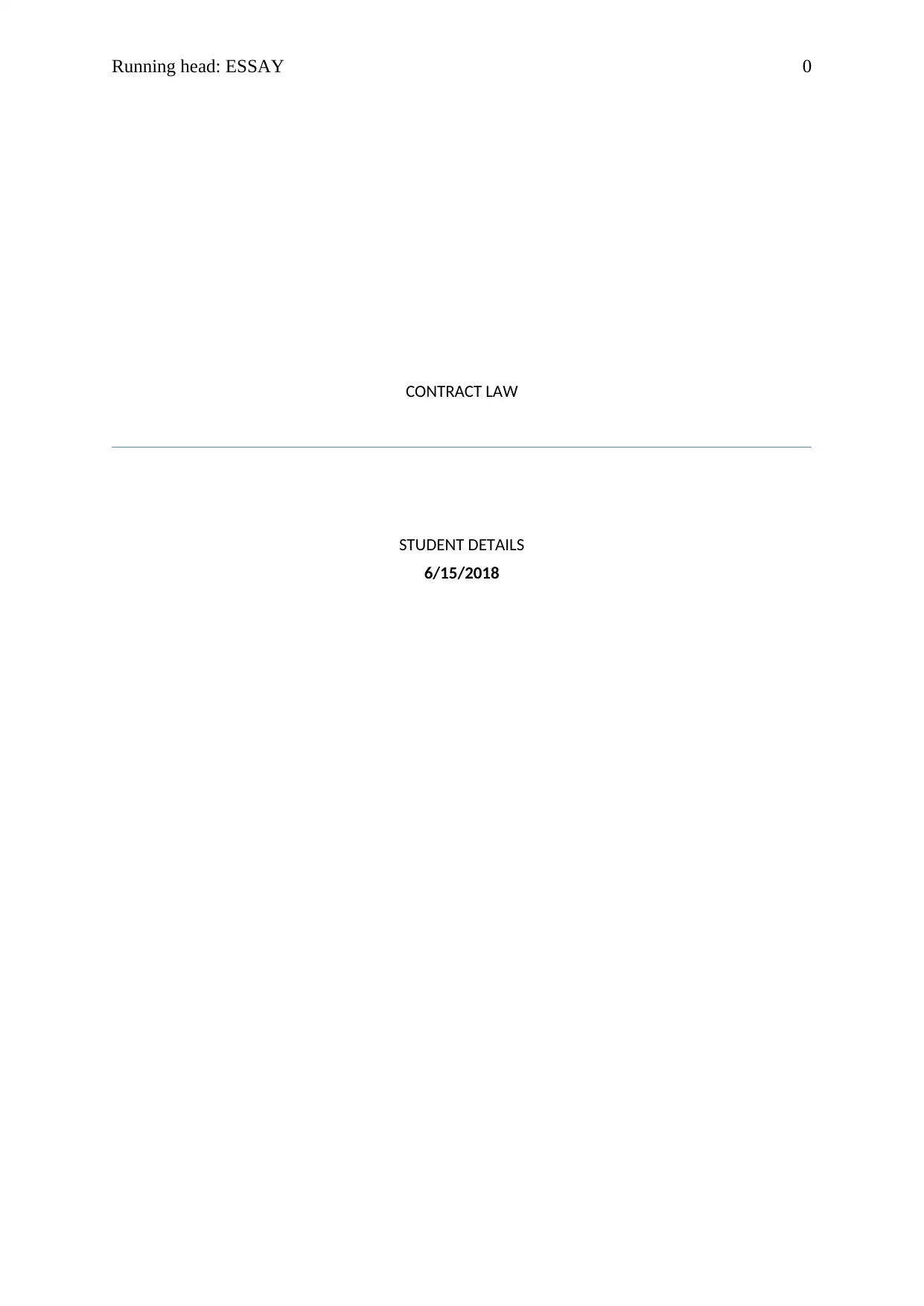
Running head: ESSAY 0
CONTRACT LAW
STUDENT DETAILS
6/15/2018
CONTRACT LAW
STUDENT DETAILS
6/15/2018
Secure Best Marks with AI Grader
Need help grading? Try our AI Grader for instant feedback on your assignments.

ESSAY 1
Contents
Introduction...........................................................................................................................................2
Remedies available to innocent party for breach of contract-................................................................2
Conclusion-...........................................................................................................................................5
Reference...............................................................................................................................................6
Contents
Introduction...........................................................................................................................................2
Remedies available to innocent party for breach of contract-................................................................2
Conclusion-...........................................................................................................................................5
Reference...............................................................................................................................................6
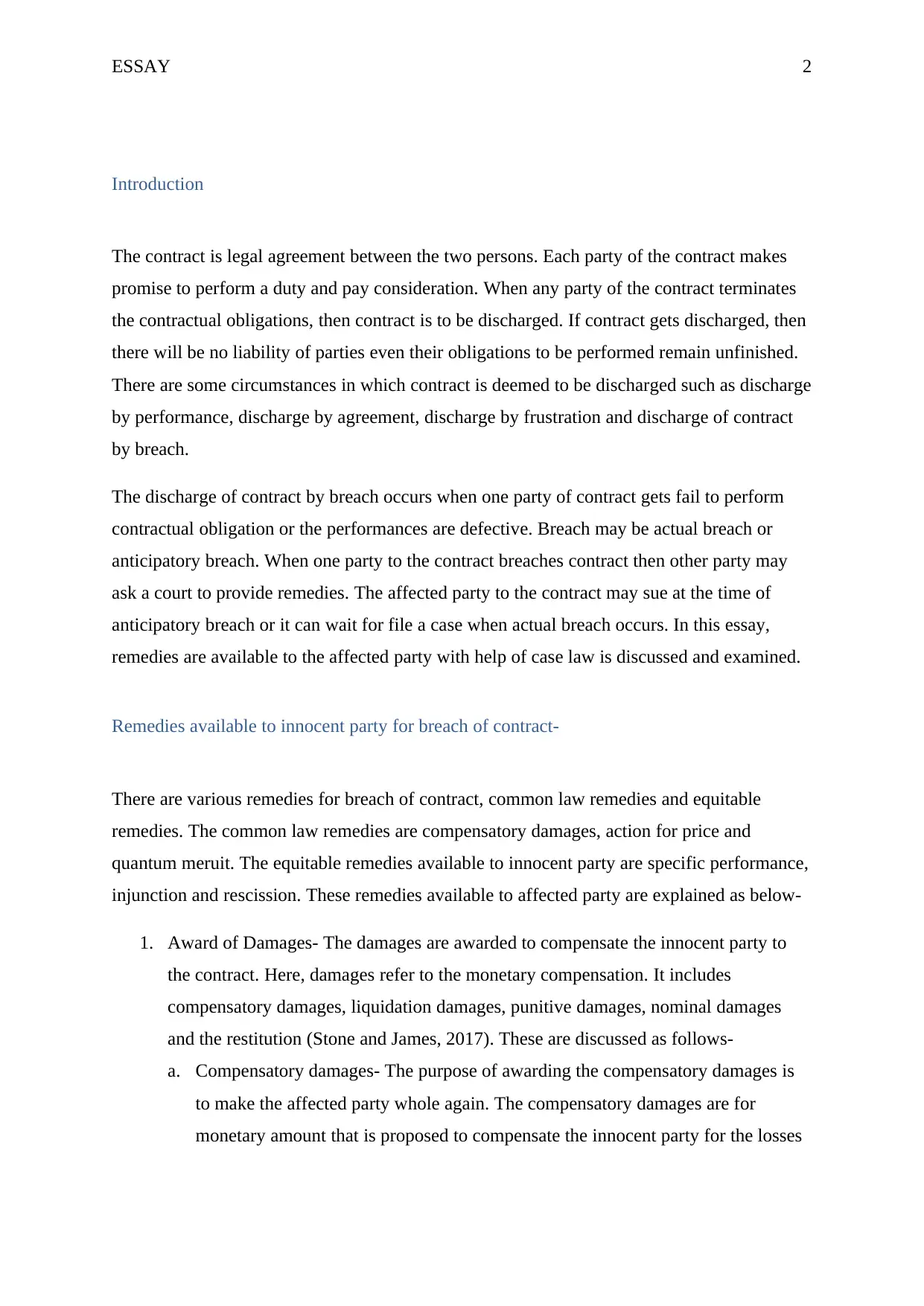
ESSAY 2
Introduction
The contract is legal agreement between the two persons. Each party of the contract makes
promise to perform a duty and pay consideration. When any party of the contract terminates
the contractual obligations, then contract is to be discharged. If contract gets discharged, then
there will be no liability of parties even their obligations to be performed remain unfinished.
There are some circumstances in which contract is deemed to be discharged such as discharge
by performance, discharge by agreement, discharge by frustration and discharge of contract
by breach.
The discharge of contract by breach occurs when one party of contract gets fail to perform
contractual obligation or the performances are defective. Breach may be actual breach or
anticipatory breach. When one party to the contract breaches contract then other party may
ask a court to provide remedies. The affected party to the contract may sue at the time of
anticipatory breach or it can wait for file a case when actual breach occurs. In this essay,
remedies are available to the affected party with help of case law is discussed and examined.
Remedies available to innocent party for breach of contract-
There are various remedies for breach of contract, common law remedies and equitable
remedies. The common law remedies are compensatory damages, action for price and
quantum meruit. The equitable remedies available to innocent party are specific performance,
injunction and rescission. These remedies available to affected party are explained as below-
1. Award of Damages- The damages are awarded to compensate the innocent party to
the contract. Here, damages refer to the monetary compensation. It includes
compensatory damages, liquidation damages, punitive damages, nominal damages
and the restitution (Stone and James, 2017). These are discussed as follows-
a. Compensatory damages- The purpose of awarding the compensatory damages is
to make the affected party whole again. The compensatory damages are for
monetary amount that is proposed to compensate the innocent party for the losses
Introduction
The contract is legal agreement between the two persons. Each party of the contract makes
promise to perform a duty and pay consideration. When any party of the contract terminates
the contractual obligations, then contract is to be discharged. If contract gets discharged, then
there will be no liability of parties even their obligations to be performed remain unfinished.
There are some circumstances in which contract is deemed to be discharged such as discharge
by performance, discharge by agreement, discharge by frustration and discharge of contract
by breach.
The discharge of contract by breach occurs when one party of contract gets fail to perform
contractual obligation or the performances are defective. Breach may be actual breach or
anticipatory breach. When one party to the contract breaches contract then other party may
ask a court to provide remedies. The affected party to the contract may sue at the time of
anticipatory breach or it can wait for file a case when actual breach occurs. In this essay,
remedies are available to the affected party with help of case law is discussed and examined.
Remedies available to innocent party for breach of contract-
There are various remedies for breach of contract, common law remedies and equitable
remedies. The common law remedies are compensatory damages, action for price and
quantum meruit. The equitable remedies available to innocent party are specific performance,
injunction and rescission. These remedies available to affected party are explained as below-
1. Award of Damages- The damages are awarded to compensate the innocent party to
the contract. Here, damages refer to the monetary compensation. It includes
compensatory damages, liquidation damages, punitive damages, nominal damages
and the restitution (Stone and James, 2017). These are discussed as follows-
a. Compensatory damages- The purpose of awarding the compensatory damages is
to make the affected party whole again. The compensatory damages are for
monetary amount that is proposed to compensate the innocent party for the losses
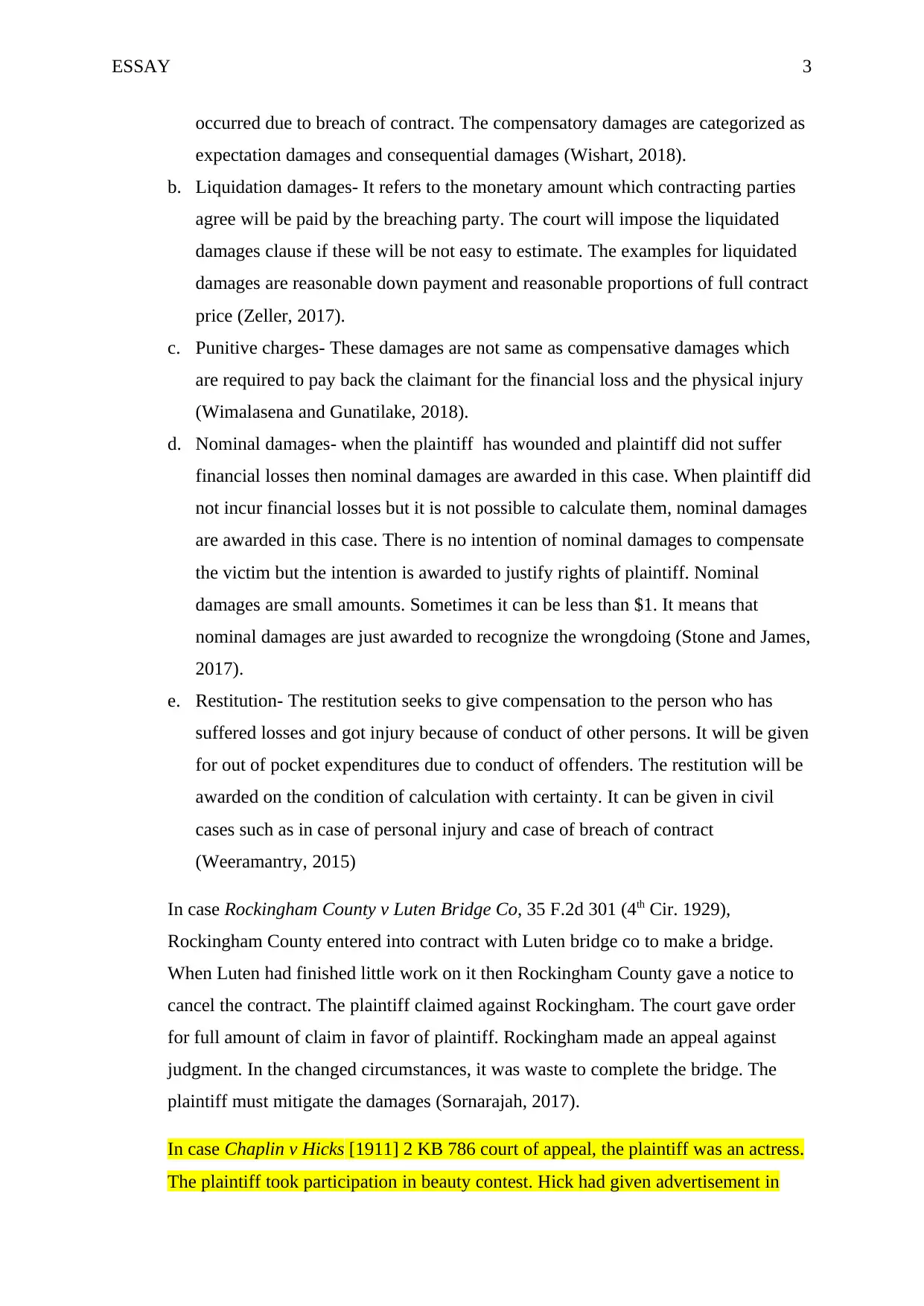
ESSAY 3
occurred due to breach of contract. The compensatory damages are categorized as
expectation damages and consequential damages (Wishart, 2018).
b. Liquidation damages- It refers to the monetary amount which contracting parties
agree will be paid by the breaching party. The court will impose the liquidated
damages clause if these will be not easy to estimate. The examples for liquidated
damages are reasonable down payment and reasonable proportions of full contract
price (Zeller, 2017).
c. Punitive charges- These damages are not same as compensative damages which
are required to pay back the claimant for the financial loss and the physical injury
(Wimalasena and Gunatilake, 2018).
d. Nominal damages- when the plaintiff has wounded and plaintiff did not suffer
financial losses then nominal damages are awarded in this case. When plaintiff did
not incur financial losses but it is not possible to calculate them, nominal damages
are awarded in this case. There is no intention of nominal damages to compensate
the victim but the intention is awarded to justify rights of plaintiff. Nominal
damages are small amounts. Sometimes it can be less than $1. It means that
nominal damages are just awarded to recognize the wrongdoing (Stone and James,
2017).
e. Restitution- The restitution seeks to give compensation to the person who has
suffered losses and got injury because of conduct of other persons. It will be given
for out of pocket expenditures due to conduct of offenders. The restitution will be
awarded on the condition of calculation with certainty. It can be given in civil
cases such as in case of personal injury and case of breach of contract
(Weeramantry, 2015)
In case Rockingham County v Luten Bridge Co, 35 F.2d 301 (4th Cir. 1929),
Rockingham County entered into contract with Luten bridge co to make a bridge.
When Luten had finished little work on it then Rockingham County gave a notice to
cancel the contract. The plaintiff claimed against Rockingham. The court gave order
for full amount of claim in favor of plaintiff. Rockingham made an appeal against
judgment. In the changed circumstances, it was waste to complete the bridge. The
plaintiff must mitigate the damages (Sornarajah, 2017).
In case Chaplin v Hicks [1911] 2 KB 786 court of appeal, the plaintiff was an actress.
The plaintiff took participation in beauty contest. Hick had given advertisement in
occurred due to breach of contract. The compensatory damages are categorized as
expectation damages and consequential damages (Wishart, 2018).
b. Liquidation damages- It refers to the monetary amount which contracting parties
agree will be paid by the breaching party. The court will impose the liquidated
damages clause if these will be not easy to estimate. The examples for liquidated
damages are reasonable down payment and reasonable proportions of full contract
price (Zeller, 2017).
c. Punitive charges- These damages are not same as compensative damages which
are required to pay back the claimant for the financial loss and the physical injury
(Wimalasena and Gunatilake, 2018).
d. Nominal damages- when the plaintiff has wounded and plaintiff did not suffer
financial losses then nominal damages are awarded in this case. When plaintiff did
not incur financial losses but it is not possible to calculate them, nominal damages
are awarded in this case. There is no intention of nominal damages to compensate
the victim but the intention is awarded to justify rights of plaintiff. Nominal
damages are small amounts. Sometimes it can be less than $1. It means that
nominal damages are just awarded to recognize the wrongdoing (Stone and James,
2017).
e. Restitution- The restitution seeks to give compensation to the person who has
suffered losses and got injury because of conduct of other persons. It will be given
for out of pocket expenditures due to conduct of offenders. The restitution will be
awarded on the condition of calculation with certainty. It can be given in civil
cases such as in case of personal injury and case of breach of contract
(Weeramantry, 2015)
In case Rockingham County v Luten Bridge Co, 35 F.2d 301 (4th Cir. 1929),
Rockingham County entered into contract with Luten bridge co to make a bridge.
When Luten had finished little work on it then Rockingham County gave a notice to
cancel the contract. The plaintiff claimed against Rockingham. The court gave order
for full amount of claim in favor of plaintiff. Rockingham made an appeal against
judgment. In the changed circumstances, it was waste to complete the bridge. The
plaintiff must mitigate the damages (Sornarajah, 2017).
In case Chaplin v Hicks [1911] 2 KB 786 court of appeal, the plaintiff was an actress.
The plaintiff took participation in beauty contest. Hick had given advertisement in
Secure Best Marks with AI Grader
Need help grading? Try our AI Grader for instant feedback on your assignments.
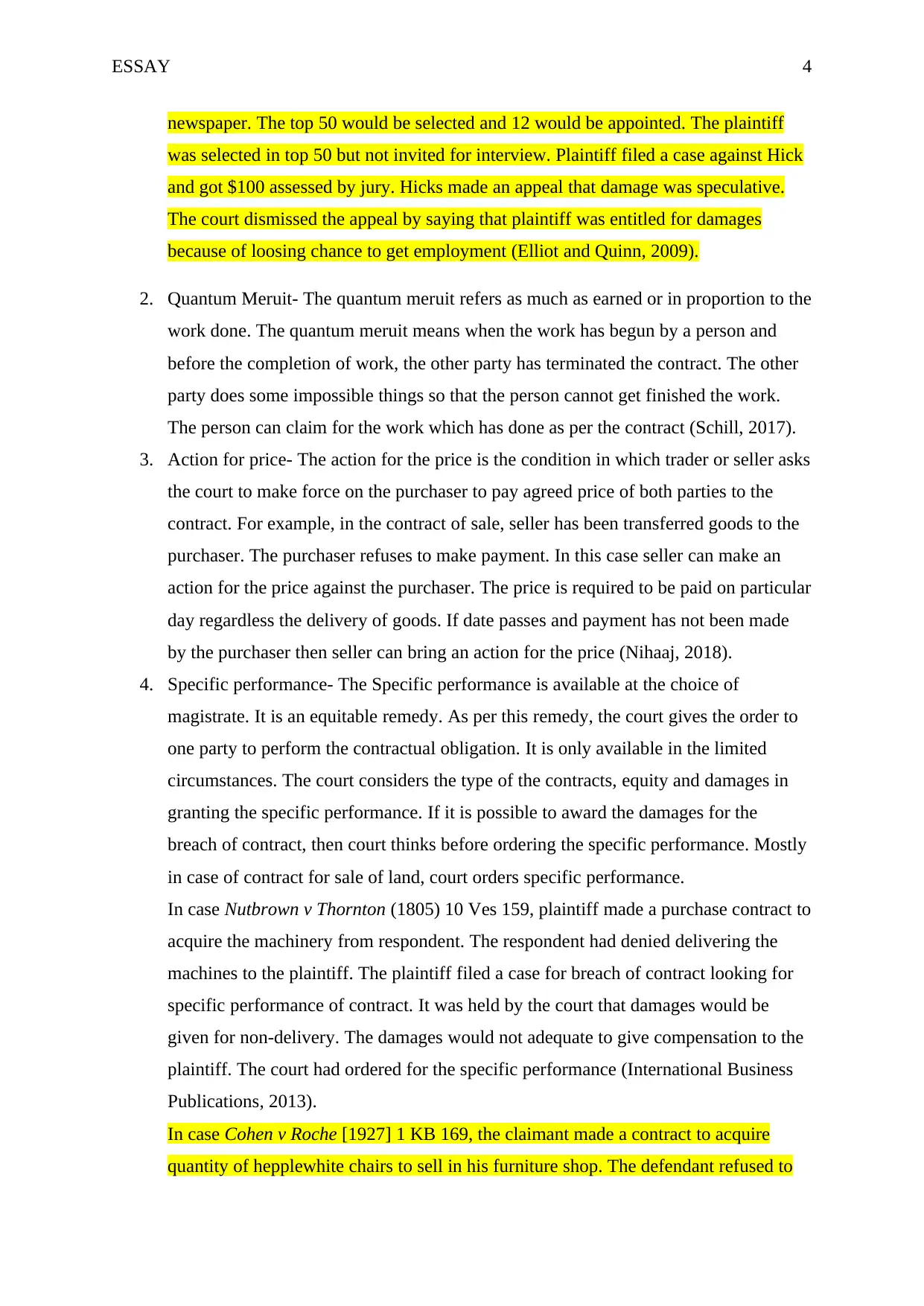
ESSAY 4
newspaper. The top 50 would be selected and 12 would be appointed. The plaintiff
was selected in top 50 but not invited for interview. Plaintiff filed a case against Hick
and got $100 assessed by jury. Hicks made an appeal that damage was speculative.
The court dismissed the appeal by saying that plaintiff was entitled for damages
because of loosing chance to get employment (Elliot and Quinn, 2009).
2. Quantum Meruit- The quantum meruit refers as much as earned or in proportion to the
work done. The quantum meruit means when the work has begun by a person and
before the completion of work, the other party has terminated the contract. The other
party does some impossible things so that the person cannot get finished the work.
The person can claim for the work which has done as per the contract (Schill, 2017).
3. Action for price- The action for the price is the condition in which trader or seller asks
the court to make force on the purchaser to pay agreed price of both parties to the
contract. For example, in the contract of sale, seller has been transferred goods to the
purchaser. The purchaser refuses to make payment. In this case seller can make an
action for the price against the purchaser. The price is required to be paid on particular
day regardless the delivery of goods. If date passes and payment has not been made
by the purchaser then seller can bring an action for the price (Nihaaj, 2018).
4. Specific performance- The Specific performance is available at the choice of
magistrate. It is an equitable remedy. As per this remedy, the court gives the order to
one party to perform the contractual obligation. It is only available in the limited
circumstances. The court considers the type of the contracts, equity and damages in
granting the specific performance. If it is possible to award the damages for the
breach of contract, then court thinks before ordering the specific performance. Mostly
in case of contract for sale of land, court orders specific performance.
In case Nutbrown v Thornton (1805) 10 Ves 159, plaintiff made a purchase contract to
acquire the machinery from respondent. The respondent had denied delivering the
machines to the plaintiff. The plaintiff filed a case for breach of contract looking for
specific performance of contract. It was held by the court that damages would be
given for non-delivery. The damages would not adequate to give compensation to the
plaintiff. The court had ordered for the specific performance (International Business
Publications, 2013).
In case Cohen v Roche [1927] 1 KB 169, the claimant made a contract to acquire
quantity of hepplewhite chairs to sell in his furniture shop. The defendant refused to
newspaper. The top 50 would be selected and 12 would be appointed. The plaintiff
was selected in top 50 but not invited for interview. Plaintiff filed a case against Hick
and got $100 assessed by jury. Hicks made an appeal that damage was speculative.
The court dismissed the appeal by saying that plaintiff was entitled for damages
because of loosing chance to get employment (Elliot and Quinn, 2009).
2. Quantum Meruit- The quantum meruit refers as much as earned or in proportion to the
work done. The quantum meruit means when the work has begun by a person and
before the completion of work, the other party has terminated the contract. The other
party does some impossible things so that the person cannot get finished the work.
The person can claim for the work which has done as per the contract (Schill, 2017).
3. Action for price- The action for the price is the condition in which trader or seller asks
the court to make force on the purchaser to pay agreed price of both parties to the
contract. For example, in the contract of sale, seller has been transferred goods to the
purchaser. The purchaser refuses to make payment. In this case seller can make an
action for the price against the purchaser. The price is required to be paid on particular
day regardless the delivery of goods. If date passes and payment has not been made
by the purchaser then seller can bring an action for the price (Nihaaj, 2018).
4. Specific performance- The Specific performance is available at the choice of
magistrate. It is an equitable remedy. As per this remedy, the court gives the order to
one party to perform the contractual obligation. It is only available in the limited
circumstances. The court considers the type of the contracts, equity and damages in
granting the specific performance. If it is possible to award the damages for the
breach of contract, then court thinks before ordering the specific performance. Mostly
in case of contract for sale of land, court orders specific performance.
In case Nutbrown v Thornton (1805) 10 Ves 159, plaintiff made a purchase contract to
acquire the machinery from respondent. The respondent had denied delivering the
machines to the plaintiff. The plaintiff filed a case for breach of contract looking for
specific performance of contract. It was held by the court that damages would be
given for non-delivery. The damages would not adequate to give compensation to the
plaintiff. The court had ordered for the specific performance (International Business
Publications, 2013).
In case Cohen v Roche [1927] 1 KB 169, the claimant made a contract to acquire
quantity of hepplewhite chairs to sell in his furniture shop. The defendant refused to
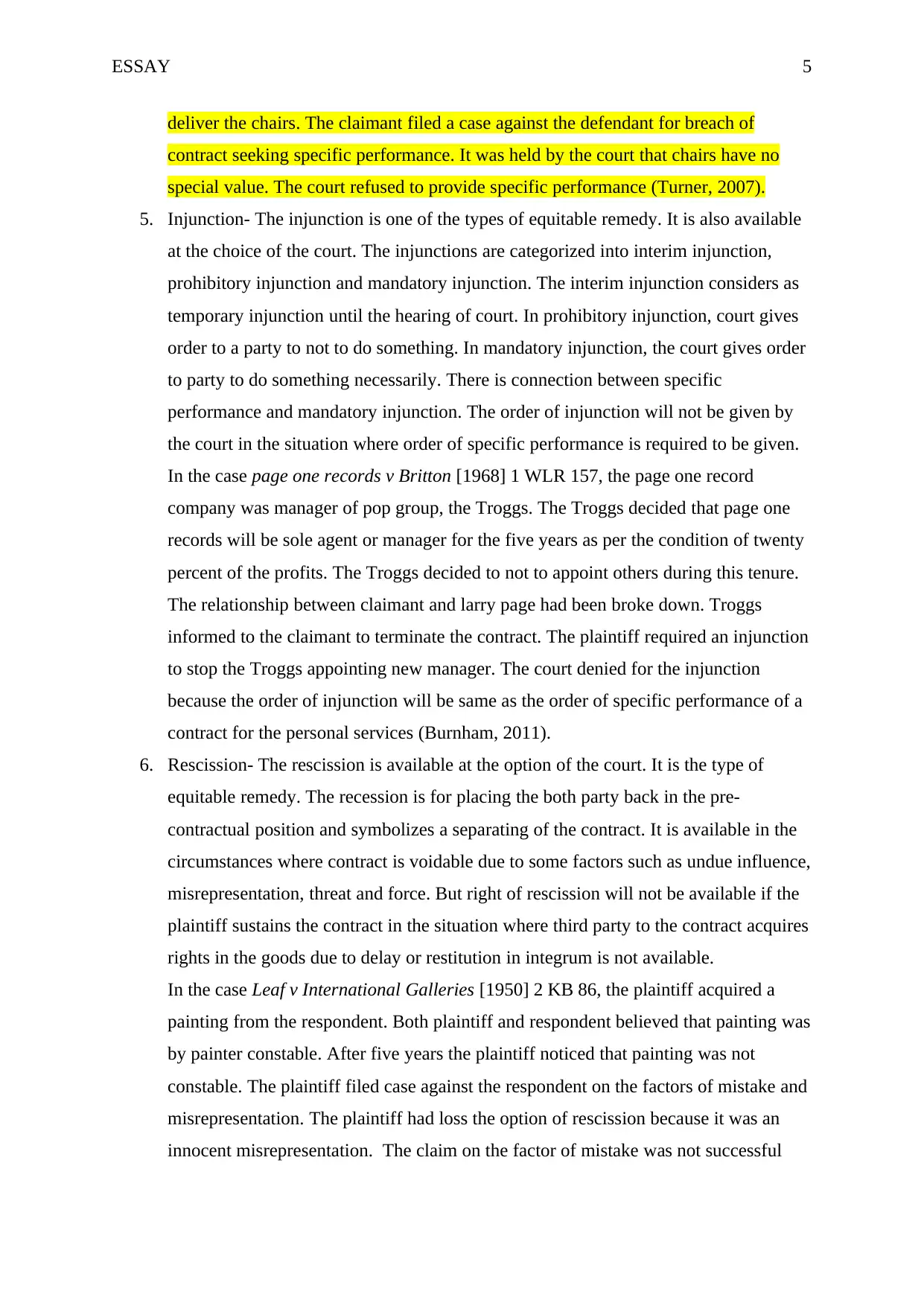
ESSAY 5
deliver the chairs. The claimant filed a case against the defendant for breach of
contract seeking specific performance. It was held by the court that chairs have no
special value. The court refused to provide specific performance (Turner, 2007).
5. Injunction- The injunction is one of the types of equitable remedy. It is also available
at the choice of the court. The injunctions are categorized into interim injunction,
prohibitory injunction and mandatory injunction. The interim injunction considers as
temporary injunction until the hearing of court. In prohibitory injunction, court gives
order to a party to not to do something. In mandatory injunction, the court gives order
to party to do something necessarily. There is connection between specific
performance and mandatory injunction. The order of injunction will not be given by
the court in the situation where order of specific performance is required to be given.
In the case page one records v Britton [1968] 1 WLR 157, the page one record
company was manager of pop group, the Troggs. The Troggs decided that page one
records will be sole agent or manager for the five years as per the condition of twenty
percent of the profits. The Troggs decided to not to appoint others during this tenure.
The relationship between claimant and larry page had been broke down. Troggs
informed to the claimant to terminate the contract. The plaintiff required an injunction
to stop the Troggs appointing new manager. The court denied for the injunction
because the order of injunction will be same as the order of specific performance of a
contract for the personal services (Burnham, 2011).
6. Rescission- The rescission is available at the option of the court. It is the type of
equitable remedy. The recession is for placing the both party back in the pre-
contractual position and symbolizes a separating of the contract. It is available in the
circumstances where contract is voidable due to some factors such as undue influence,
misrepresentation, threat and force. But right of rescission will not be available if the
plaintiff sustains the contract in the situation where third party to the contract acquires
rights in the goods due to delay or restitution in integrum is not available.
In the case Leaf v International Galleries [1950] 2 KB 86, the plaintiff acquired a
painting from the respondent. Both plaintiff and respondent believed that painting was
by painter constable. After five years the plaintiff noticed that painting was not
constable. The plaintiff filed case against the respondent on the factors of mistake and
misrepresentation. The plaintiff had loss the option of rescission because it was an
innocent misrepresentation. The claim on the factor of mistake was not successful
deliver the chairs. The claimant filed a case against the defendant for breach of
contract seeking specific performance. It was held by the court that chairs have no
special value. The court refused to provide specific performance (Turner, 2007).
5. Injunction- The injunction is one of the types of equitable remedy. It is also available
at the choice of the court. The injunctions are categorized into interim injunction,
prohibitory injunction and mandatory injunction. The interim injunction considers as
temporary injunction until the hearing of court. In prohibitory injunction, court gives
order to a party to not to do something. In mandatory injunction, the court gives order
to party to do something necessarily. There is connection between specific
performance and mandatory injunction. The order of injunction will not be given by
the court in the situation where order of specific performance is required to be given.
In the case page one records v Britton [1968] 1 WLR 157, the page one record
company was manager of pop group, the Troggs. The Troggs decided that page one
records will be sole agent or manager for the five years as per the condition of twenty
percent of the profits. The Troggs decided to not to appoint others during this tenure.
The relationship between claimant and larry page had been broke down. Troggs
informed to the claimant to terminate the contract. The plaintiff required an injunction
to stop the Troggs appointing new manager. The court denied for the injunction
because the order of injunction will be same as the order of specific performance of a
contract for the personal services (Burnham, 2011).
6. Rescission- The rescission is available at the option of the court. It is the type of
equitable remedy. The recession is for placing the both party back in the pre-
contractual position and symbolizes a separating of the contract. It is available in the
circumstances where contract is voidable due to some factors such as undue influence,
misrepresentation, threat and force. But right of rescission will not be available if the
plaintiff sustains the contract in the situation where third party to the contract acquires
rights in the goods due to delay or restitution in integrum is not available.
In the case Leaf v International Galleries [1950] 2 KB 86, the plaintiff acquired a
painting from the respondent. Both plaintiff and respondent believed that painting was
by painter constable. After five years the plaintiff noticed that painting was not
constable. The plaintiff filed case against the respondent on the factors of mistake and
misrepresentation. The plaintiff had loss the option of rescission because it was an
innocent misrepresentation. The claim on the factor of mistake was not successful
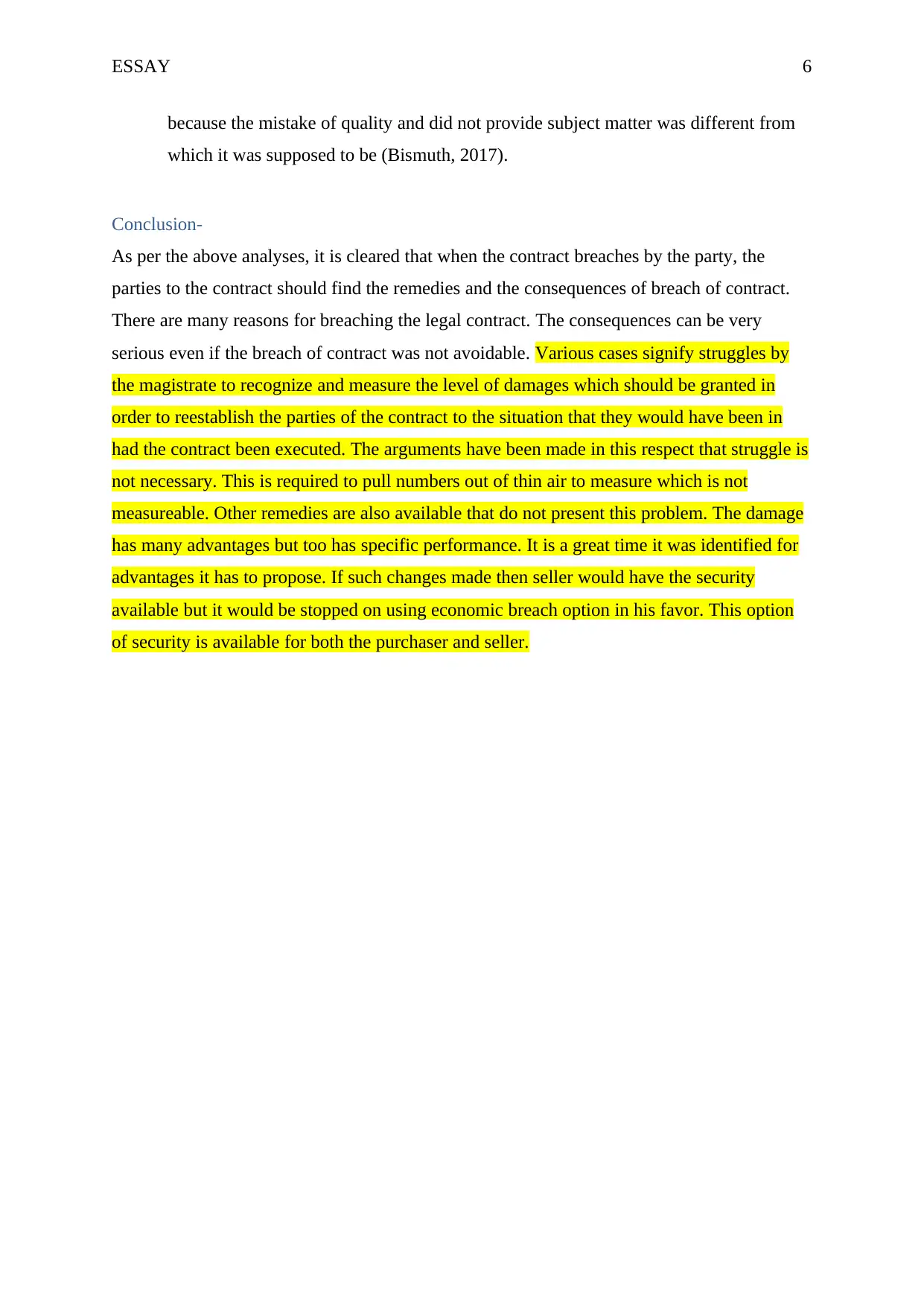
ESSAY 6
because the mistake of quality and did not provide subject matter was different from
which it was supposed to be (Bismuth, 2017).
Conclusion-
As per the above analyses, it is cleared that when the contract breaches by the party, the
parties to the contract should find the remedies and the consequences of breach of contract.
There are many reasons for breaching the legal contract. The consequences can be very
serious even if the breach of contract was not avoidable. Various cases signify struggles by
the magistrate to recognize and measure the level of damages which should be granted in
order to reestablish the parties of the contract to the situation that they would have been in
had the contract been executed. The arguments have been made in this respect that struggle is
not necessary. This is required to pull numbers out of thin air to measure which is not
measureable. Other remedies are also available that do not present this problem. The damage
has many advantages but too has specific performance. It is a great time it was identified for
advantages it has to propose. If such changes made then seller would have the security
available but it would be stopped on using economic breach option in his favor. This option
of security is available for both the purchaser and seller.
because the mistake of quality and did not provide subject matter was different from
which it was supposed to be (Bismuth, 2017).
Conclusion-
As per the above analyses, it is cleared that when the contract breaches by the party, the
parties to the contract should find the remedies and the consequences of breach of contract.
There are many reasons for breaching the legal contract. The consequences can be very
serious even if the breach of contract was not avoidable. Various cases signify struggles by
the magistrate to recognize and measure the level of damages which should be granted in
order to reestablish the parties of the contract to the situation that they would have been in
had the contract been executed. The arguments have been made in this respect that struggle is
not necessary. This is required to pull numbers out of thin air to measure which is not
measureable. Other remedies are also available that do not present this problem. The damage
has many advantages but too has specific performance. It is a great time it was identified for
advantages it has to propose. If such changes made then seller would have the security
available but it would be stopped on using economic breach option in his favor. This option
of security is available for both the purchaser and seller.
Paraphrase This Document
Need a fresh take? Get an instant paraphrase of this document with our AI Paraphraser
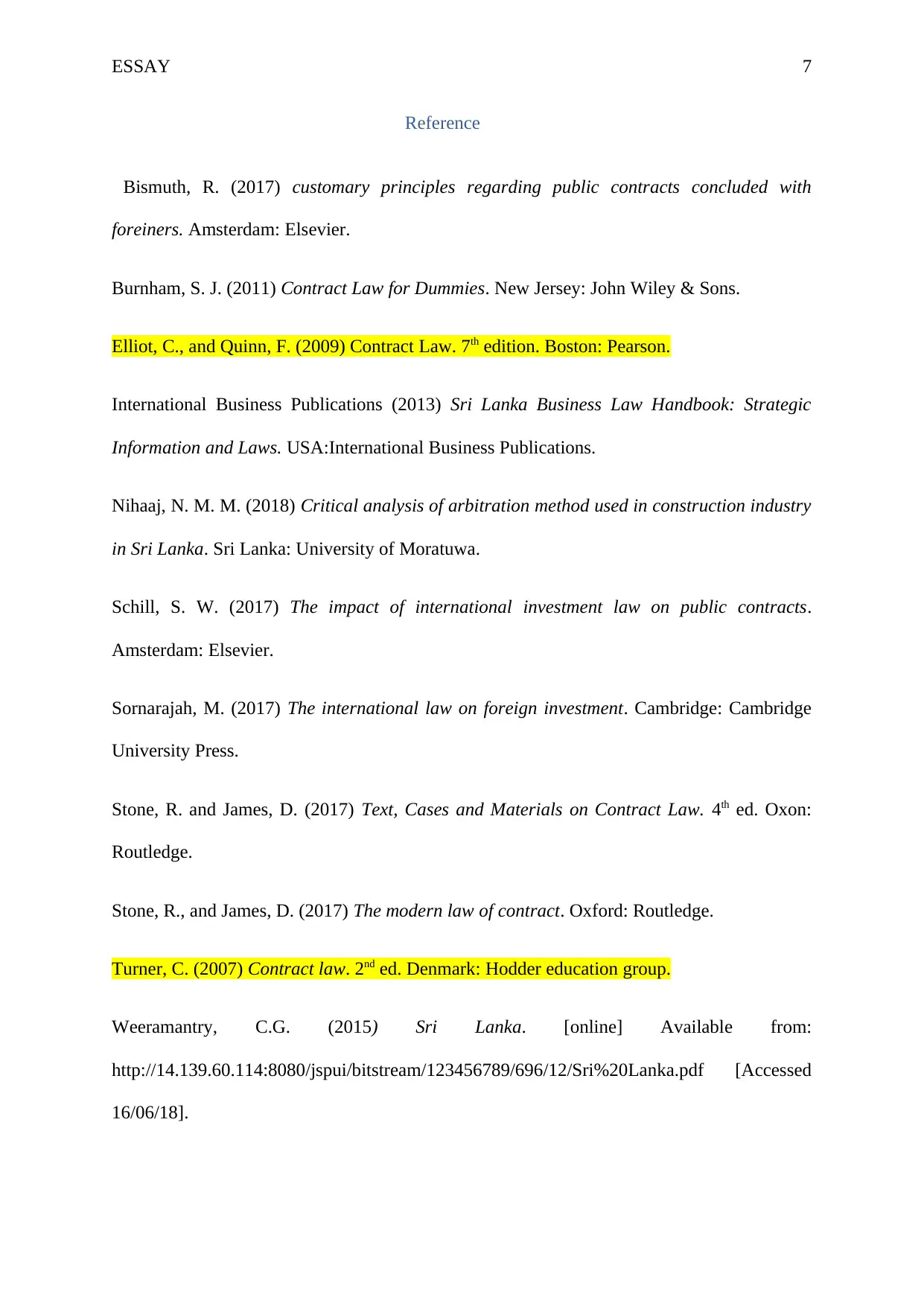
ESSAY 7
Reference
Bismuth, R. (2017) customary principles regarding public contracts concluded with
foreiners. Amsterdam: Elsevier.
Burnham, S. J. (2011) Contract Law for Dummies. New Jersey: John Wiley & Sons.
Elliot, C., and Quinn, F. (2009) Contract Law. 7th edition. Boston: Pearson.
International Business Publications (2013) Sri Lanka Business Law Handbook: Strategic
Information and Laws. USA:International Business Publications.
Nihaaj, N. M. M. (2018) Critical analysis of arbitration method used in construction industry
in Sri Lanka. Sri Lanka: University of Moratuwa.
Schill, S. W. (2017) The impact of international investment law on public contracts.
Amsterdam: Elsevier.
Sornarajah, M. (2017) The international law on foreign investment. Cambridge: Cambridge
University Press.
Stone, R. and James, D. (2017) Text, Cases and Materials on Contract Law. 4th ed. Oxon:
Routledge.
Stone, R., and James, D. (2017) The modern law of contract. Oxford: Routledge.
Turner, C. (2007) Contract law. 2nd ed. Denmark: Hodder education group.
Weeramantry, C.G. (2015) Sri Lanka. [online] Available from:
http://14.139.60.114:8080/jspui/bitstream/123456789/696/12/Sri%20Lanka.pdf [Accessed
16/06/18].
Reference
Bismuth, R. (2017) customary principles regarding public contracts concluded with
foreiners. Amsterdam: Elsevier.
Burnham, S. J. (2011) Contract Law for Dummies. New Jersey: John Wiley & Sons.
Elliot, C., and Quinn, F. (2009) Contract Law. 7th edition. Boston: Pearson.
International Business Publications (2013) Sri Lanka Business Law Handbook: Strategic
Information and Laws. USA:International Business Publications.
Nihaaj, N. M. M. (2018) Critical analysis of arbitration method used in construction industry
in Sri Lanka. Sri Lanka: University of Moratuwa.
Schill, S. W. (2017) The impact of international investment law on public contracts.
Amsterdam: Elsevier.
Sornarajah, M. (2017) The international law on foreign investment. Cambridge: Cambridge
University Press.
Stone, R. and James, D. (2017) Text, Cases and Materials on Contract Law. 4th ed. Oxon:
Routledge.
Stone, R., and James, D. (2017) The modern law of contract. Oxford: Routledge.
Turner, C. (2007) Contract law. 2nd ed. Denmark: Hodder education group.
Weeramantry, C.G. (2015) Sri Lanka. [online] Available from:
http://14.139.60.114:8080/jspui/bitstream/123456789/696/12/Sri%20Lanka.pdf [Accessed
16/06/18].
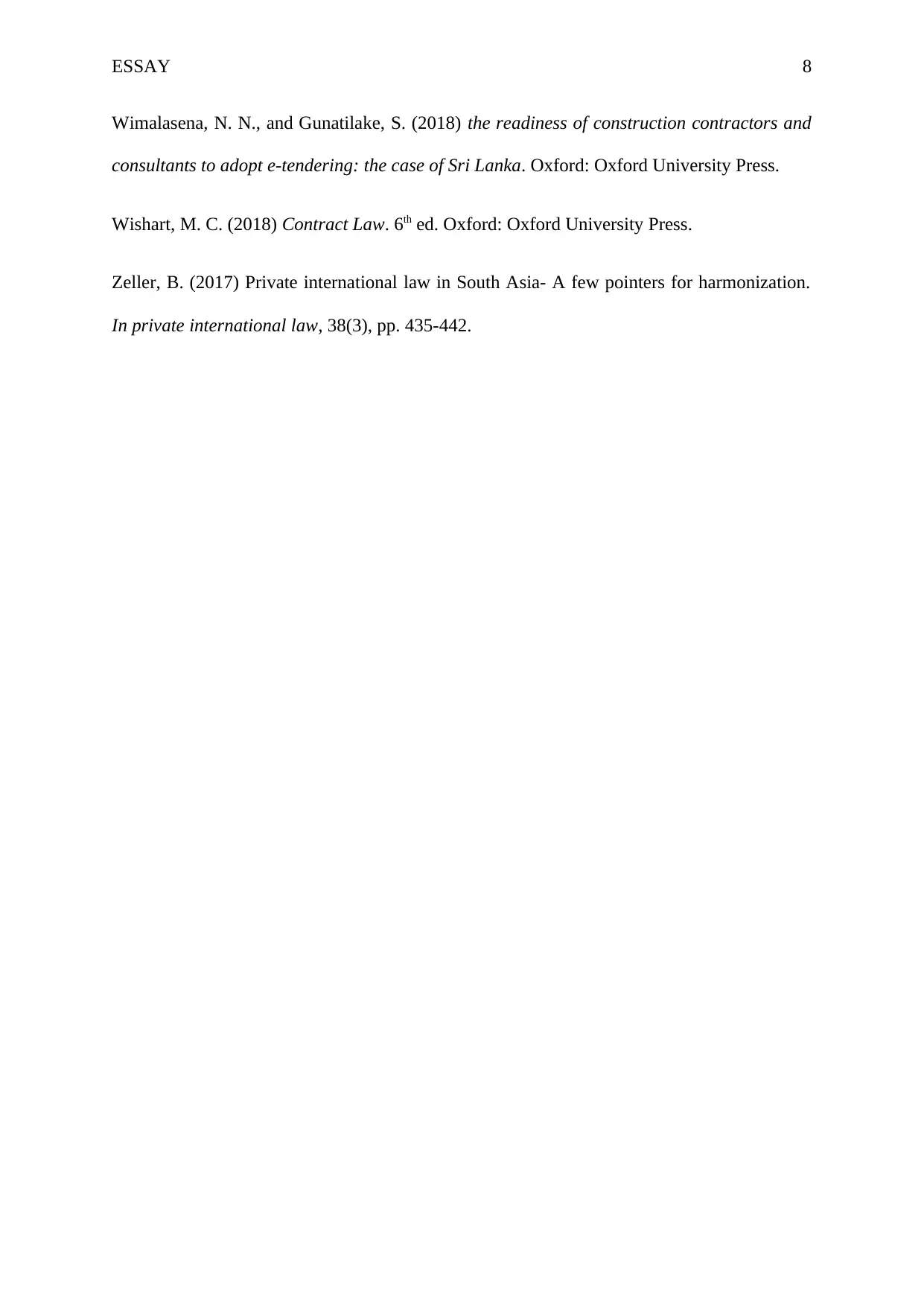
ESSAY 8
Wimalasena, N. N., and Gunatilake, S. (2018) the readiness of construction contractors and
consultants to adopt e-tendering: the case of Sri Lanka. Oxford: Oxford University Press.
Wishart, M. C. (2018) Contract Law. 6th ed. Oxford: Oxford University Press.
Zeller, B. (2017) Private international law in South Asia- A few pointers for harmonization.
In private international law, 38(3), pp. 435-442.
Wimalasena, N. N., and Gunatilake, S. (2018) the readiness of construction contractors and
consultants to adopt e-tendering: the case of Sri Lanka. Oxford: Oxford University Press.
Wishart, M. C. (2018) Contract Law. 6th ed. Oxford: Oxford University Press.
Zeller, B. (2017) Private international law in South Asia- A few pointers for harmonization.
In private international law, 38(3), pp. 435-442.
1 out of 9
Related Documents
Your All-in-One AI-Powered Toolkit for Academic Success.
+13062052269
info@desklib.com
Available 24*7 on WhatsApp / Email
![[object Object]](/_next/static/media/star-bottom.7253800d.svg)
Unlock your academic potential
© 2024 | Zucol Services PVT LTD | All rights reserved.




